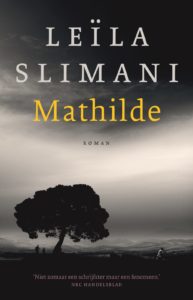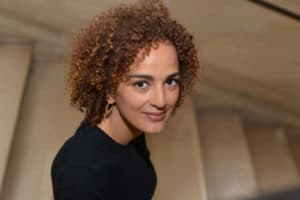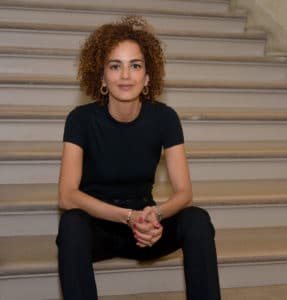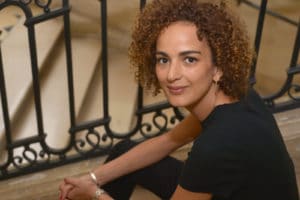Na de publicatie van sociaal-maatschappelijke boeken als In de tuin van het beest, Seks en leugens en de Prix Goncourt-winnende roman Een zachte hand groeide de Frans-Marokkaanse schrijfster Leïla Slimani (39) de afgelopen jaren uit tot een belangrijke stem in de Franse literatuur. Ze werd door president Macron benoemd tot ambassadeur van de Franse taal en cultuur en door het Amerikaanse tijdschrift Vanity Fair uitgeroepen tot de op een na meest invloedrijke Franse persoon van dit moment.
Met haar nieuwe roman Mathilde houdt de Française het dichter bij huis. Dit eerste deel van de trilogie Het land van anderen gaat over haar familiegeschiedenis. Na de Tweede Wereldoorlog wordt de Franse Mathilde, gebaseerd op Slimani’s grootmoeder, verliefd op Amine, een Marokkaanse officier in het Franse leger. Mathilde en Amine vertrekken naar Marokko en vestigen zich op zijn familieboerderij in een klein dorpje in de omgeving van Rabat en krijgen een dochter, Aïcha, en zoon Selim. Tegen de achtergrond van de onafhankelijkheidsstrijd van Marokko ontwikkelt Mathilde zich tot plattelandsdokter.

Buitenstaander
Wat zette u aan tot het schrijven van deze persoonlijke en meer traditionele roman?
‘Mijn vorige boeken waren verhalen met een sterke hoofdpersoon die zich afspeelden in een stad als Parijs, in onze huidige tijd. Wrede boeken ook, en op een bepaalde manier klinisch en koud. Ik wilde een andere kant van mezelf laten zien, meer lyrisch en liefdevol. Bovenal wil ik met het schrijven van deze familiegeschiedenis ontdekken en begrijpen wie ik ben. Waarom ik me altijd een buitenstaander voel, een vreemde. Waarom ik iemand ben die nergens bij hoort. Die in het land van anderen leeft. Waar komt dat gevoel vandaan? Om dat te begrijpen moest ik terug naar mijn grootouders.’
Wat voor vrouw was uw grootmoeder?
‘Ik ben de kleindochter van een vrouw die tamelijk onafhankelijk was, heel modern voor haar tijd. Mijn grootmoeder – Mathilde in het boek – moest haar plek zien te vinden in een patriarchale en gewelddadige wereld, maar ook in haar familie en gemeenschap. Als meisje uit de Elzas behoorde ze niet tot de Marokkaanse gemeenschap van haar man, ze begreep zijn religie noch zijn taal. Ze had een moeilijker leven dan ik vooraf besefte. Maar ook voor mijn grootvader moet hun situatie ingewikkeld zijn geweest. Dat heeft me veel geleerd over liefde. Liefde vraagt om echt proberen te begrijpen wie de ander is. En het betekent ook dat je in een relatie in zekere zin afstand neemt van jezelf, van wie je bent.’
Uw oma verhuisde van Frankrijk naar Marokko en bewoog zich tussen twee culturen. U groeide op in Marokko en verhuisde om te studeren naar Frankrijk. Herkent u die verscheurdheid?
‘Een belangrijk verschil tussen mij en mijn oma is dat zij een heel sterke identiteit had. Ook al woonde ze in Marokko, leerde ze de taal en hield ze van het land en zijn inwoners, ze voelde zich duidelijk Elzasiaans. Zo’n duidelijke identiteit voel ik niet. Tussen haar generatie en die van mij is er sprake geweest van allerlei vermenging tussen culturen. Daardoor heb ik nooit het gevoel ervaren dat ik écht ergens bij hoor.’

Hoe komt dat? Zij nam haar Franse identiteit mee naar Marokko. Voor u werkte dat dus niet op dezelfde manier, u voelde zich geen Marokkaanse die deze identiteit meenam naar Frankrijk?
‘Dat zal duidelijk worden in deel twee van de trilogie, die over mijn moeder, mijn ouders gaat. Zij groeiden op in Marokko tijdens de kolonisatie. Ze waren Marokkaans, maar gingen naar een Franse school, leerden de Franse taal, de Franse normen en waarden, de Franse geschiedenis. Dus in hun eigen land werd hen de cultuur van een ander land bijgebracht. Dat leverde een complexe identiteit op, die zij weer doorgaven aan mijn zussen en mij. Mijn moeder was de eerste gynaecologe van Marokko, mijn vader was een hoge ambtenaar. Ze waren ruimdenkend en niet religieus en leerden ons dat vrijheid, democratie en gelijkheid tussen man en vrouw belangrijk waren. Daar ben ik ze dankbaar voor, maar tegelijkertijd leefden we daardoor ook in een eigen wereldje. Mijn leven was anders dan dat van de meeste Marokkaanse kinderen. Dat maakte me soms kwaad, omdat ik wilde zijn zoals mijn Marokkaanse vrienden, met hun religie en tradities en hun Marokkaanse gezinnen.
Mijn ontheemde gevoel is dus denk ik meer verbonden met mijn ouders dan met mijn grootouders. Het derde deel gaat over mijn generatie, met veel immigranten, in Frankrijk, de Verenigde Staten, Engeland of elders. Over de problematiek van de globalisering en immigratie, en het verlies van identiteit. In de wereld van vandaag beschouwen we het als iets goeds om veel te reizen, een kosmopoliet te zijn. Wortels zijn minder belangrijk dan voorheen. Mijn grootouders waren sterk gehecht aan hun land – letterlijk. Ze hadden een boerderij; voor hen was grond heel belangrijk. Terwijl ik het gevoel heb dat ik overal zou kunnen wonen.’
Welke invloed heeft dat gebrek aan wortels op uw bestaan?
‘Toen ik jonger was, voelde ik me vaak eenzaam en kon ik jaloers zijn op mensen die tot een gemeenschap of groep behoren. Maar aan de andere kant is het voor mij als schrijver juist een voordeel is om een buitenstaander zijn, en anderen en de wereld te kunnen observeren. Nu vind ik het gevoel een vreemdeling te zijn juist prettig. Het geeft ook vrijheid.’
Misschien u hoort toch wel bij een groep: generatiegenoten met datzelfde ontheemde gevoel.
‘In zekere zin wel, en daarom wil ik er ook over schijven, omdat meer mensen zich ermee zullen kunnen identificeren. Mensen die rondlopen met dezelfde vragen: waarom voel ik me nergens thuis? Waarom hoor ik nergens bij? Na de verschijning van het eerste deel heb ik veel brieven ontvangen van mensen die zeiden dat ze het verhaal van mijn familie herkennen en nu beter begrijpen waar ze vandaan komen.’

Wat hebt u over uzelf ontdekt door uw familiegeschiedenis te ontrafelen?
‘Mijn uitgever wees me er ooit op dat in mijn eerste roman het woord ‘schaamte’ heel vaak voorkwam. Hij vroeg me waarom dat zo’n issue voor me was, maar daar wist ik destijds het antwoord niet op. Waarom schaamde ik mezelf zo vaak, of was ik bang voor het oordeel van anderen? Dat komt bij mijn moeder vandaan; bij het meisje dat arm was, uit een gemengd huwelijk was voortgekomen en dus van een gemengd ras was, dat werd uitgelachen om haar rare haar, om haar rare ouders. Dat trauma, die schaamte, heb ik van mijn moeder geërfd. Nu ik weet waar dat vandaan komt, heb ik dat kunnen afleggen en achter me kunnen laten. En niet alleen ik ben ervan bevrijd, mijn moeder ook. We hebben er veel over gepraat, en ik heb haar kunnen laten zien dat het voorbij is. Voor even waren onze rollen omgedraaid en kon ik haar vertellen dat ik begreep en herkende wat ze heeft meegemaakt en gevoeld, en hoe moeilijk dat is geweest. Mijn moeder is een bescheiden vrouw met een groot gevoel van waardigheid; ze zou zich nooit ergens over beklagen. Maar op een bepaalde manier heb ik heel goed begrepen waar ze vandaan is gekomen en wat het voor haar heeft betekend. Want toen ze Mathilde las en over zichzelf als klein meisje had gelezen, zei ze: ‘Ik heb je dit nooit verteld, maar toch heb je het begrepen’. Ik heb echt geprobeerd me in dat meisje te verplaatsen, dat meisje dat zich zo verloren voelde, dat trots was op haar ouders en niet begreep waarom haar huidskleur en krulhaar zo’n heikel punt was, waarom haar ouders vernederd werden. Voor een kind is het funest als zijn ouders worden vernederd, dat heeft een heel ingrijpende invloed. Ook dat wilde ik laten zien.’
Hebt u dat zelf ook meegemaakt?
‘Ja, ik weet wat het is. Vanwege een politieke kwestie verloor mijn vader zijn baan toen ik 13 was, hij mocht het huis niet uit, had geen paspoort. In een patriarchaal land als Marokko was dat nogal wat. Mensen spraken niet meer met hem. Op mijn twintigste werd mijn vader in de gevangenis gegooid vanwege een politieke kwestie. Toen hij onschuldig werd bevonden, was hij al gestorven. Voor een kind is de vernedering van zijn ouders zeer ingrijpend, en elk kind reageert daar anders op. Iemand kan bijvoorbeeld proberen de waardigheid van zijn ouders te herstellen door er alles aan te doen om te slagen in het leven. Om die reden wilde ik er denk ik ook over schrijven: om mijn moeder een vleugje trots en vreugde te geven.’
U had krachtige vrouwen als voorbeeld: uw grootmoeder was plattelandsdokter, uw moeder de eerste gynaecologe van Marokko.
‘Klopt, en mijn vader was ook feministisch. Onze ouders hielden ons voor dat we ambitieus moesten zijn en hard moesten werken. Studeren, studeren en nog eens studeren. Zodat we ons eigen geld zouden kunnen verdienen en niet afhankelijk zouden zijn van een echtgenoot. We konden worden wat we maar wilden als we maar wel zouden uitblinken. Dus als je clown wilde worden: prima. Maar dan wel de beste clown van de wereld. Ze geloofden in ons, en dat gaf veel vertrouwen en kracht. Natuurlijk gaf het ook druk, maar wel een goede vorm van druk. Je kinderen leren kansen te benutten is denk ik beter dan wanneer je ze leert dat het allemaal niet uitmaakt en ze middelmatigheid bijbrengt.’

Wat kunnen we leren van dit verhaal?
‘Dat de wereld complex is en niet op te delen valt in goed of slecht, zwart of wit of meer van zulke simpele tegenstellingen. Het gaat erom dat we proberen de ander te begrijpen. Samenleven met anderen is moeilijk, of het nou in een land is, in een familie of in een relatie. Soms moet je met elkaar vechten, en bovenal moet je proberen verdraagzaam te zijn, begrip en respect te hebben, en compassie. Je hoort soms mensen zeggen dat culturen en nationaliteiten niet met elkaar moeten vermengen, dat we de zuiverheid van beschavingen moeten bewaren. Wie je daarin wil laten geloven, geeft een valse voorstelling van zaken. Dat is een ideologie die heel gevaarlijk is. De wereld is complex, de mens is complex. Literatuur laat die complexiteit zien en laat er licht op schijnen. Elk monster heeft ook goed in zich en elke engel heeft ook een duistere kant. Wil je weten wie iemand is, dan moet je vooral kijken naar wat iemand doet. We worden vooral gedefinieerd door onze daden, onze waarden, dat waar we in geloven en voor strijden. Wat zegt het feit dat op mijn paspoort staat dat ik Marokkaans en Frans ben over mij? Belangrijker is of je moedig of sterk bent, dat je moeder en geliefde bent.’
U hebt de afgelopen jaren veel invloed gekregen. Waar wilt u die voor aanwenden?
‘Vroeger geloofde ik niet in rolmodellen. Maar ik ben me gaan realiseren dat ik als klein meisje nooit boeken las of films keek met hoofdpersonen die op mij leken. Als ik een tijdschrift opensloeg stond daar nooit een vrouw in wie ik mijzelf herkende. Dus misschien is het wel zo dat als een meisje in Marokko, Algerije of Tunesië een boek van me leest of een tijdschrift openslaat en daarin mijn gezicht tegenkomt, beseft dat als een vrouw met zo’n gezicht als ik, met dit haar en deze huidskleur, met deze naam, het zover geschopt heeft, ook zíj kan worden wat ze maar wil. Dat zij daar recht op heeft.’
Leïla Slimani, Mathilde; vertaling Gertrud Maes (deel 1 van de trilogie Het land van anderen) is verschenen bij Nieuw Amsterdam, € 22,99
